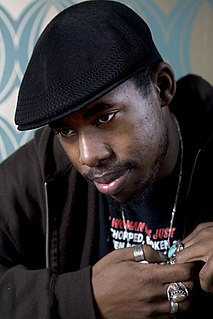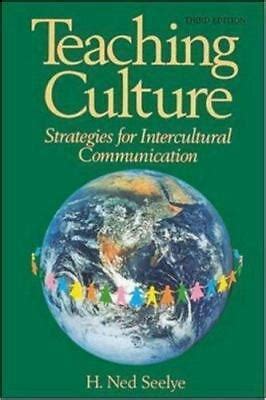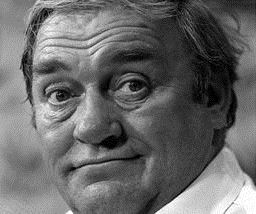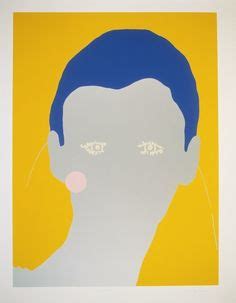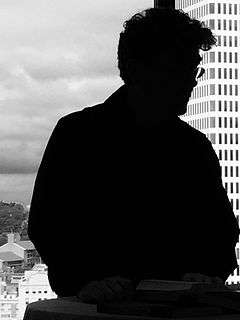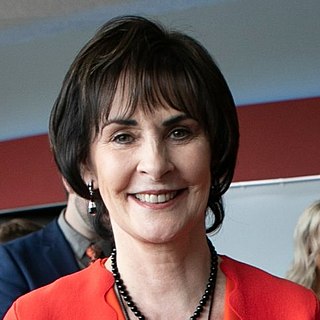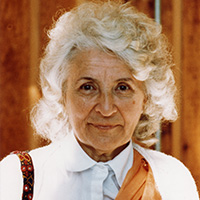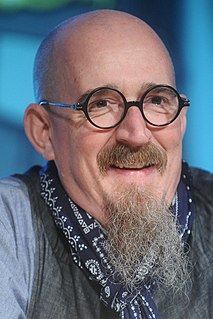Top 301 Reflective Quotes & Sayings - Page 5
Explore popular Reflective quotes.
Last updated on April 19, 2025.
When I'm writing for a book, it's much more reflective process. I have certain things that may not translate well to the stage, but, when they're on the page, people can really get into them. My first two books were aiming to be funnier, but the third was more about deep exploration. Things about being a parent and growing older that I thought would be perfect for a book.
The fact that these scientific theories have a fine track record of successful prediction and explanation speaks for itself. (Which is not to say that I don't directly discuss the work of those philosophers who would disagree.) But even if we grant this, many will argue that scientific knowledge in humans, and, indeed, reflective knowledge in general, is quite different in kind from the knowledge we see in other animals.
We've always told stories through music and rhythm and movement, and what we know as western opera has only been around for a few hundred years and in different forms before that. There is great passion regardless of the fact that it's expensive and people who invest in it are giving money because they believe in it. They're not getting anything back other than satisfaction and enjoyment of hopefully many people having a human, deep, reflective and meditative experience that at its core is incredibly emotional.
As we progress along the intercultural journey, we become self-reflective about habits of heart and mind and the ways these are expressed in daily life. We develop strategies for encountering change, unfamiliarity and ambiguity in creative ways. We begin to realize that what is taken, as "common sense" is really "cultural sense". Our life becomes richer and deeper for having encountered differences.
I know now that I began writing in a country where the word 'woman' and the word 'poet' were almost magnetically opposed. One word was used to invoke collective nurture, the other to sketch out self-reflective individualism. Both states were necessary - that much the culture conceded - but they were oil and water and could not be mixed.
I think our literary tradition has to evolve, has to explore its form and its spirit through writers and thinkers, rather than let the lazy, easy traditional narrative - which is controlled by the publishing industry - roll all over the readers and dominate the market. I think our readers and cinemagoers have been trained to read and watch very mainstream stuff. It's like being given sleeping pills. It sends people to a non-reflective sleep state.
Pedagogy is not about training, it is about critically educating people to be self reflective, capable of critically address their relationship with others and with the larger world. Pedagogy in this sense provides not only important critical and intellectual competencies; it also enables people to intervene critically in the world.
I was sat at the bottom of the garden a week ago, smoking a reflective cheroot, thinking about this and that - mostly that, and I just happened to glance at the night sky and I marvelled at the millions of stars glistening like pieces of quicksilver thrown carelessly onto black velvet. In awe I watched the waxen moon ride across the zenith of the heavens like an amber chariot towards the void of infinite space wherein the tethered bolts of Jupiter and Mars hang forever in their orbital majesty; and as I looked at all this, I thought, 'I must put a roof on this lavatory.
In some ways I spend longer at non-fiction because there are a lot of different threads to bring together. But non-fiction is more reflective than immersive. The problem with fiction sometimes is that you have to leave the real world to enter the fictional one. And that takes so much, goes into your head for so long?.?.?.?I don't know, I just feel less inclined toward that these days, and more inclined to remain in my own life. I do like really good fiction, but it's getting harder to hold my attention in a novel.
I found that gloss paint suited me entirely, and its qualities still intrigue me. It's viscous and fluid and feels like a pool. It's highly reflective, which means there are layers of looking. You look at the picture, and you look at the surface, then you look at the reflection in the surface behind you, then you look at yourself.
Vicky became more serious and her tone more reflective as she remarked, "Life has so much pain that one needs a catharsis. I don't mean escape. You don't escape in books. On the contrary, they help you to realize yourself more fully. Mon Dieu, I'm glad I have them. When I find myself in a situation in which I'd rather not be - because of the perculiar circumstances of my life - I have this outlet. You may think me tres superieure but I'm not really, I am just what I am and live the way I like."
Since the point of erotica is to offer the consumer sexual experiences without having to compromise with the demands of the other sex, it is a window into each sex's unalloyed desires. Pornography for men is visual, anatomical, impulsive, floridly promiscuous and devoid of context and character. Erotica for women is far more likely to be verbal, psychological, reflective, serially monogamous and rich in context and character. Men fantasise about copulating with bodies; women fantasise about making love to people.
Time is a topological manifold. It is a surface. Events flow across it like water over land and like water flowing over land, when the land is flat, the water becomes reflective and moves slowly. When the landscape becomes disrupted, the water moves faster and chaotic attractors appear and new kinds of activity emerge and out of that new activity, there comes the new states that define the future.
Leading with character gives the wise leader clear-cut advantages. They are easier to trust and follow; they honor commitments and promises; their words and behavior match; they are always engaged in and by the world; they are open to "reflective backtalk": they can speak with conviction because they believe in what they are saying...and everyone else knows that. They are comfortable in their own skin. They feel at ease in the spotlight and they enjoy it there. They tend to be more receptive to opportunity and risk.
Bible Gateway has created a way to make the Word of God accessible and reflective of the technological world we live in. Bible Gateway has proven that embracing innovation can bring people closer to God. I've used unconventional ways to bridge the gap between the secular and the spiritual worlds in my own career, so I admire Bible Gateway's bold, brilliant, and effective way of contributing to the spiritual journeys of many people around the world.
[ Rajiv Gandhi] was very reflective and rueful and regretful about the fact that his children's education...He wanted them to get educated outside of India, but he said to me the only place that he found where they would be safe was in Russia, and he didn't really want them to be educated there! So, I said, "Well, send them to Australia. I'll look after them." And my security bloke went absolutely bloody bananas, and I said, "We'll look after them." But, in the end, he didn't send them.
Poetry restores language by breaking it, and I think that much contemporary writing restores fantasy, as a genre of writing in contrast to a genre of commodity or a section in a bookstore, by breaking it. Michael Moorcock revived fantasy by prying it loose from morality; writers like Jeff VanderMeer, Stepan Chapman, Lucius Shepard, Jeffrey Ford, Nathan Ballingrud are doing the same by prying fantasy away from pedestrian writing, with more vibrant and daring styles, more reflective thinking, and a more widely broadcast spectrum of themes.
Behavioral scientists distinguish between fast thinking and slow thinking. Fast thinking is represented in the mind's System 1: it is automatic, intuitive, and often emotional. Slow thinking, reflected in System 2, is deliberative and reflective; it likes statistics. It's hard to think of a purer System 1 candidate than Trump.
The saying goes that history repeats itself; personal histories do the same. We can gather the lessons of others' lives through observation, conversation, and by seeking advice. We can use the automatic system to find out who the happy people are, and the reflective system to evaluate how they got to be that way. Pursuing happiness need not be a lonely endeavor. In fact, throwing in our lot with others may be a very good way of coping with the disappointments of choice.
The memories which peaceful country scenes call up, are not of this world, nor of its thoughts and hopes. Their gentle influence may teach us how to weave fresh garlands for the graves of those we loved: may purify our thoughts, and bear down before it old enmity and hatred; but beneath all this, there lingers, in the least reflective mind, a vague and half-formed consciousness of having held such feelings long before, in some remote and distant time, which calls up solemn thoughts of distant times to come, and bends down pride and worldliness beneath it.
My Auntie CeCe - I can kind of joke and say all I need to do is pray. But that's literally what she does... She lives what she sings. I've learned a lot about her in that way, so in bringing her to the stage, I knew what sort of demeanor she needed to have. Her songs are very reflective of who she is in real life.
People say we're similar with Lady Gaga, that we both mix all these things in the pot and spit them out differently, but she spits it out exactly the same! None of her music's reflective of how weird she wants to be or thinks she is. She models herself on Grace Jones and Madonna, but the music sounds like 20-year-old Ibiza music, you know? She's not progressive, but she's a good mimic.
The credit of my good upbringing goes to my mother, who's not only been a single parent to my brother and I, but she's also been 'our' manager for the longest time. Our father, on the other hand, remained elusive and away from the family for most part of our lives, which left a certain void but also made us creative and reflective.
It was the kind of pure, undiffused light that can only come from a really hot blue sky, the kind that makes even a concrete highway painful to behold and turns every distant reflective surface into a little glint of flame. Do you know how sometimes on very fine days the sun will shine with a particular intensity that makes the most mundane objects in the landscape glow with an unusual radiance, so that buildings and structures you normally pass without a glance suddenly become arresting, even beautiful? Well, they seem to have that light in Australia nearly all the time.
[Hillary Clinton] sort of very cautious kind of uncomfortable, clumsy interaction with the black lives movement, who are very smart in recognizing that historical memory matters, that those legacies live on when you don't identify them, when you're not willing to be in dialog with them, when you're not willing to be self-reflective about the very part that you played as part of that apparatus of power.
It may be seriously questioned whether the philosophies... which isolate mind and set it over against the world did not have their origin in the fact that the reflective or theoretical class of men elaborated a large stock of ideas which social conditions did not allow them to act upon and test. Consequently men were thrown back into their own thoughts as ends in themselves.
I think one of the great things behind game theory, or game development, especially in education now, apropos, digital and new media, is finding a better, easier, more intuitive way to learn that takes that away from the drudge and the structured work part and puts it into the reflective, "I'm alive, I'm a human being, I'm not working right now," part. And I think that I would like to see music and arts and humanities become more able to even the color spectrum of the fan of activities.
Simply put, meta-writing is writing that is self-conscious, self-reflective, and aware of itself as an artifice. The writer is aware she's writing, and she's aware there's a reader, which goes all the way back to Montaigne's often-used address "dear reader," or his brief introduction to Essais: "To the Reader." It can be done in a myriad of ways.
Seeing games become more of a young person thing, I feel like a toy I grew up with has been left behind. I don't want to. I want this thing to be respected by adults. I want this thing to be growing with me. It's important to have games that could be more nuanced and reflective of the real world and relevant to adults.
Really unreflective people are now inwardly without Christianity, and the more moderate and reflective people of the intellectual middle class now possess only an adapted, that is to say marvelously simplified Christianity. A god who in his love arranges everything in a manner that in the end will be best for us; a god who gives to us and takes from us our virtue and our happiness, so that as a whole all is meet and fit and there is no reason for us to take life sadly, let alone exclaim against it; in short, resignation and modest demands elevated to godhead
When you are thinking about whether you have an obligation to try to save people's lives, you don't usually think, well, how close by are they? Understanding what we are reacting to can change the way we think about the problem. If, biologically, morality evolved to help us get along with individuals in our community, it makes sense that we have heartstrings that can be tugged - and that they are not going to be tugged very hard from far away. But does that make sense? From a more reflective moral perspective, that may just be a cognitive glitch.
The best way for parents to go about acquiring a mind-set of self-reflective parenting will be different for different individuals. Some people will find that they are already very close to being the parent they are striving to be. Other people will find reading books or blog articles to be very helpful and some other people might benefit most by engaging in discussions on the internet.
All of these concoctions that we think are Mexican, are in no way reflective of the deep, incredibly old, complex and sophisticated deep regional cuisine of Mexico. Or the new modern Mexican cuisine, which has really been exploding over the last few years. I think we just have a completely misrepresented view of how good, how complex these flavors are. I think we could learn a lot more. It's a great cuisine that's really moving forward, faster than any other.
But to demand that a work be “relatable” expresses a different expectation: that the work itself be somehow accommodating to, or reflective of, the experience of the reader or viewer. The reader or viewer remains passive in the face of the book or movie or play: she expects the work to be done for her. If the concept of identification suggested that an individual experiences a work as a mirror in which he might recognize himself, the notion of relatability implies that the work in question serves like a selfie: a flattering confirmation of an individual's solipsism.
Silence allows you to watch your mind and become aware of the thoughts that you may be acting on unconsciously. When you see the thoughts, you can make a conscious choice to act on the thought or change your mind, instead of going along with the noise. I have seen people who don't want to look at themselves keep going until something happens that makes them stop — a sickness or an accident — but it gives them that reflective, quiet space where they can face what is difficult in their mind. We each have a unique purpose to fulfill in this life and inklings can come in those quiet moments.
I also think within the scene, a specific scene - if I were to play a part that I played 10 years ago now, my interpretation of that scene would be totally different. I would be making different choices. Because I can't somehow subtract all of the experiences that I've had in my life. And it's fascinating to see, because somewhere I'm very reflective in that. You know, I've been playing basically actually close to 40 years old, so I'm somewhere lost in age in this movie. But it's been fascinating to see that I can't subtract that time.
All of my movies are about how I wish the world would work. I've made very few movies about how the world worked. I could name them on one and a half hands, about how my movies have been very reflective of how the world was exactly. A lot of my movies are really about the way I wish the world was, and that's what this whole art form is all about. It's an interpretive art form.
There can never be any real opposition between religion and science; for the one is the complement of the other. Every serious and reflective person realizes, I think, that the religious element in his nature must be recognized and cultivated if all the powers of the human soul are to act together in perfect balance and harmony. And indeed it was not by accident that the greatest thinkers of all ages were deeply religious souls
We start out in identical perfection: bright, reflective, full of sun. The accident of our lives bruises us into dirty individuality. We meet with grief. Our character dulls and tarnishes. We meet with guilt. We know, we know: the price of living is corruption. There isn’t as much light as there once was. In the grave we lapse back into undifferentiated sameness
I argue is that philosophers have had a tendency to present a kind of mystical view of the powers of reflection. Unreflective belief acquisition is seen in mechanistic terms, but when philosophers talk about reflection, it is as if reflective processes are not bound by the kinds of limitations which inevitably arise from being embedded within the same causal structure which governs unreflective belief acquisition.
It hurts to see that everything on television is based on pillaring people. Nobody's sort of given the opportunity to be nice anymore. I think that is somewhat reflective of tragically the society that we live in today where we want to know people off their pedestal or we want to hurt, we want to harm instead of boosting and following by example. It's always about the crud of society, the black sheep of society that producers seem to think the public wants rather than my old theory of the cream rising to the top.
Philosophy is not a body of knowledge to impart to someone, that's why reading philosophy books isn't always the best way of learning philosophy. Philosophy is really more the process of rational engagement, rational reflection with a diversity of views and ideas and opinions and trying to sort of reason your way through to a more reflective position. I think if you look at it that way, philosophizing is to some extent some small way a part of almost everyone's lives although they don't recognize it as such and a lot of people are embarrassed about it.
The telephone conversation is, by its very nature, reactive, not reflective. Immediacy is its prime virtue. ... The letter, written in absorbed solitude, is an act of faith: it assumes the presence of humanity: world and self are generated from within: loneliness is courted, not feared. To write a letter is to be alone with my thoughts in the conjured presence of another person. I keep myself imaginative company. I occupy the empty room.
Comics are reflective of what's going on in larger culture. Wonder Woman came to be in her position when women were first entering the workplace in numbers during the war. Then Wonder Woman had another rise in the '70s when Gloria Steinem latched on to her as an icon for the [feminist] movement. I think we're seeing another wave of feminism today, a fourth wave characterized by intersectionality and the internet. And I think it falls right in line that we would see another wave of superheroines coming to the fore.
...The Court ...[recognizes]...the persistence of racial inequality and a majority's acknowledgement of Congress's authority to act affirmatively, not only to end discrimination, but also to counteract discrimination's lingering effects. Those effects, reflective of a system of racial caste [legal segregation and discrimination] only recently ended, are evident in our work places, markets, and neighborhoods. Job applicants with identical resumes, qualifications, and interview styles still experience different receptions, depending on their race.
Having faith in the plan of salvation includes steadfastly refusing to be diverted from our true identities and responsibilities. In the brief season of our existence on earth we may serve as a plumber, professor, farmer, physician, mechanic, bookkeeper, or teacher. These are useful activities and honorable designations; but a temporary vocation is not reflective of our true identities. Matthew was a tax collector, Luke a physician, and Peter a fisherman. In a salvational sense, 'so what!'
Like Nietzsche, Heidegger also gave up on the prospect that schools and universities would nurture the kind of reflective openness to the way of things that, certainly by the 1940s, he identified with authentic thinking. The authentic person is not the Promethean, iron-willed figure that pops up in Nietzsche, but someone more like the Daoist sages whom Heidegger admired.
I think that every educator, indeed every human being, is concerned with what is true and what is not; what experiences to cherish and which ones to avoid; and how best to relate to other human beings. We differ in how conscious we are of these questions; how reflective we are about our own stances; whether we are aware of how these human virtues are threatened by critiques (philosophical, cultural) and by technologies (chiefly the digital media). A good educator should help us all to navigate our way in this tangled web of virtues.
In classical understanding, education is the attempt to "lead out" from within the self a core of wisdom that has the power to resist falsehood and live in the light of truth, not by external norms but by reasoned and reflective self-determination. The inward teacher is the living core of our lives that is addressed and evoked by any education worthy of the name.
Characters work really well when they're reflective of the times that they're operating in. To keep these characters static - like Superman was invented in the '30s, Wonder Woman in the '40s - if they were still operating under those kinds of constraints, they'd die. These pop cultures, just like Greek myths, they have to reflect the time their stories are being told. That's what makes them relevant.
Ideally a painter (and, generally, an artist) should not become conscious of his insights: without taking the detour through his reflective processes, and incomprehensibly to himself, all his progress should enter so swiftly into the work that he is unable to recognize them in the moment of transition. Alas, the artist who waits in ambush there, watching, detaining them, will find them transformed like the beautiful gold in the fairy tale which cannot remain gold because some small detail was not taken care of.
I think the terminology I would use is 'a continuous process of reflection'. I've always thought of only two questions that have mattered to me personally. One is what is really needed in the world and the second is what's really important to me and how these two intersect. It's always been a reflective process - spiraling around these two poles.
The Japanese garden is a very important tool in Japanese architectural design because, not only is a garden traditionally included in any house design, the garden itself also reflects a deeper set of cultural meanings and traditions. Whereas the English garden seeks to make only an aesthetic impression, the Japanese garden is both aesthetic and reflective. The most basic element of any Japanese garden design comes from the realization that every detail has a significant value.
